Poker Sites Without HUDs Ranked
I’d like to admit something that might not be popular with my full-time grinder brethren: I am loving the war on poker HUD software. Loving it, in the most schadenfreude-laden way possible.
What’s HUD poker software? The acronym stands for heads-up display. HUDs in poker are software that inlays detailed statistics about opponents’ tendencies right on top of a poker site’s table graphics. Allowed to run unfettered for years, I largely blame poker HUDs for almost ruining online poker from 2008-2014.
Rank | Poker Site | HUDs Available | Bonus | Anonymous Tables | Link |
|---|---|---|---|---|---|
1 |  | 150% up to $1,500 | Yes | ||
2 |  | 100% up to $500 | Yes | ||
3 |  | 100% up to $2,000 | Yes |
Let’s take a look at:
- Who blocks HUDs entirely
- Who allows them but tries to reduce their effectiveness
- Where you’ll be completely safe from being tracked
- The telltale signs of HUD poker sites you want to avoid
Table of Contents
- Why HUDs are bad for online poker
- Ignition Poker
- Party Poker
- ACR Poker
- Even the best HUDs harmful to the poker economy
- Is using poker HUD software cheating?
- Do anonymous tables stop heads up displays like PokerTracker?
- Will all poker HUD sites eventually ban these tools?
- Is there any downside to poker sites banning HUDs?
- Players think the poker sites can’t identify everyone
- The future of HUDs – will AI come into play?
Why HUDs are bad for online poker
The worst part about poker HUDs? They give an educated online poker player who already has a skill advantage a technical advantage as well, so they can keep building their bankroll off of less skilled and more casual players. Who are the biggest victims of poker HUDs like PokerTracker, Hold’em Manager, ProPokerHUDs, and Jivaro?
- Recreational players who don’t even know HUDs exist.
- Players on mobile or tablets who don’t even have the option to run a poker HUD.
You know, only the people, money, and lifeblood of the poker world. I have good news, though: Online poker sites have fought back over the past several years and are slowly killing the HUD.
Poker sites knew that the recreational players and beginners were staying away and the cannibalizing sharks weren’t cutting it for their bottom lines. Playing at poker rooms that block or minimize HUD software is one of the most underrated factors prospective players should be checking out.
You don’t have to live with poker HUDs, but it isn’t always clear where you’ll be safe and where you’ll be on the end of a 20-tabling grinder perusing your lifetime stats whenever they need to make decisions in a hand against you.
That’s why I researched and tested every poker site I recommend to find out what they actually do to fight poker HUD tools. You don’t have to play at poker tables dominated by players who can find your leaks and weaknesses with a click.
In other words, how to make sure you have options for online poker games with a level playing field regardless of your technical knowledge.
Ignition Poker
Ignition Poker was the first to really launch an all-out assault on HUD tracking software and I think they were brilliantly ahead of their time.
Anonymous tables across cash games and tournaments and now quick seating makes this the gold standard for poker sites without HUDs. Normally, you have to pick one: a poker site with great bonuses and promotions, plenty of action for players of all skill levels and protocols in place that level the playing feel. Ignition Poker actually has them all, and their commitment to keeping HUDs away is one of the biggest reasons I’m such a huge fan of the site.
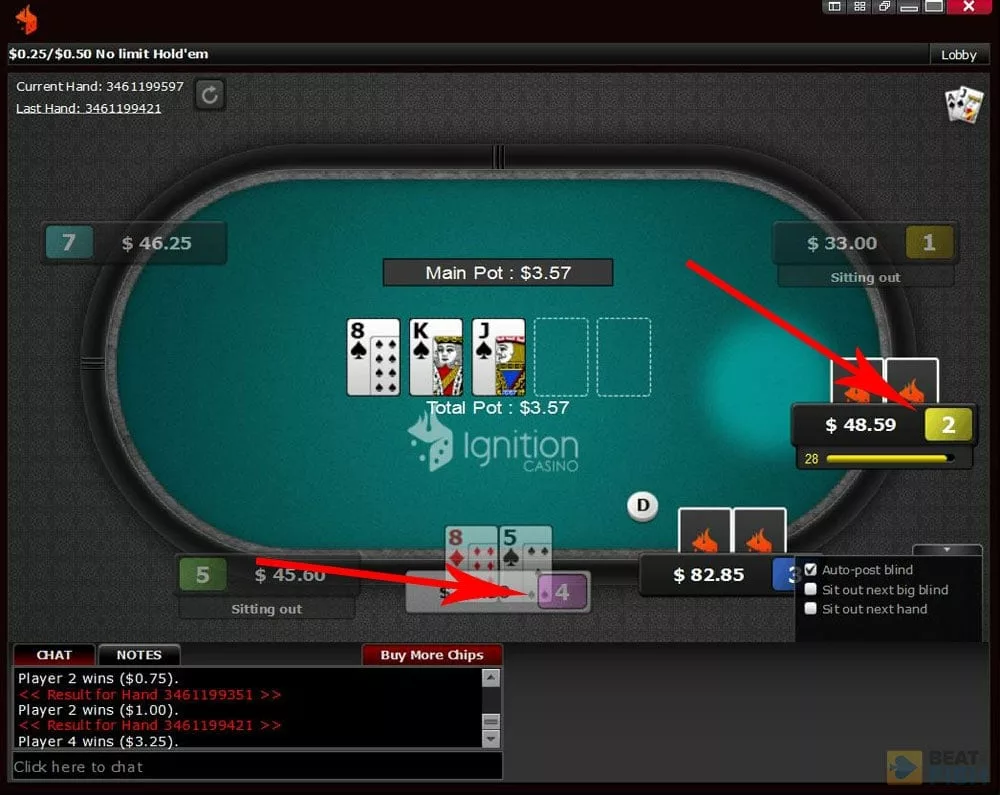
Why they’re my favorite for anonymous tables
They’ve been rendering HUDs useless for years. I remember being mildly amused and somewhat annoyed when Bovada (the ancestor of Ignition Poker) announced that they would be making their entire poker software anonymous back in 2011.
I believe they were the first to introduce them. I thought something along the lines of “What are their reasons behind a gimmick like that?” Yes, I was still fairly naïve about the effect of HUDs in online poker.
Ahead of their time. I stand and applaud them as forerunners to ban poker HUDs, such as Poker Tracker. It was a brilliant idea that the rest of the industry is starting to catch up with. The result? They’re still one of the loosest poker sites online, open to US players, and have grown exponentially since introducing anonymous tables.
All identifying data blocked from all games. While some poker sites have pussyfooted around with anonymous tables, Ignition applies them in every situation, across every cash game, Zone (fast-fold) game, Sit and Go (including Heads-up), and tournament.
Players are only given a number from 1-9 and can never be tracked across tables. This applies to every every Texas Hold’em and Omaha game.
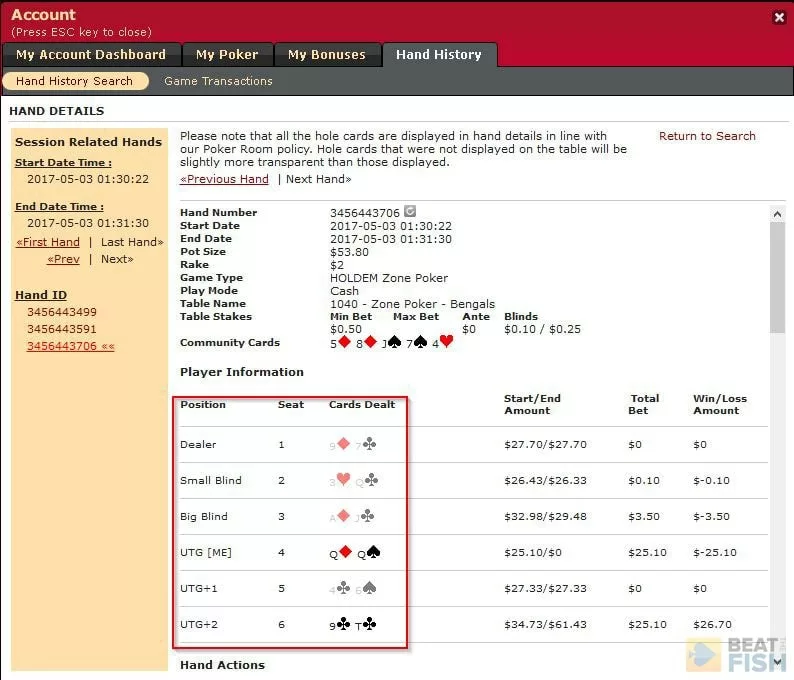
Quick seat adds another layer of protection
Quick seat now added to further level the playing field. Anonymous tables already inherently prevented “bum hunting” and seating scripts.
This is used by questionable poker HUD software players to track and sit to the left of poor players, they’ve taken things one step further to prevent table selection. Cash game players no longer see a traditional lobby interface with a table list.
Making tables more homogeneous for increased fairness. For example, to join a cash game, you now just select the stakes and table size you want to play. This is also available on their no-download software client. The software then automatically works to find a table and seat for you.
The idea is to stop heads-up display players from only choosing tables with attractive metrics like a high flop percentage to evenly spread out more skilled players. They’re a little late to the party on this one as several other poker sites have using Quick Seat for years now to limit HUDs.
Party Poker
The One of the poker sites hit hardest by HUD grinders was Party Poker. They’ve fought back in a big way and now ban them entirely.
Unfortunately, this site is not available to US poker players outside of New Jersey. Because of that, I can’t recommend it, but I can tell you what this site has done to stop the use of HUDs, which I hope other US-facing brands will take note of.
With anonymous cash games and quick seating, you won’t have to be worried about being targeted. Along with the new bonus, it’s been a boon to looser games.
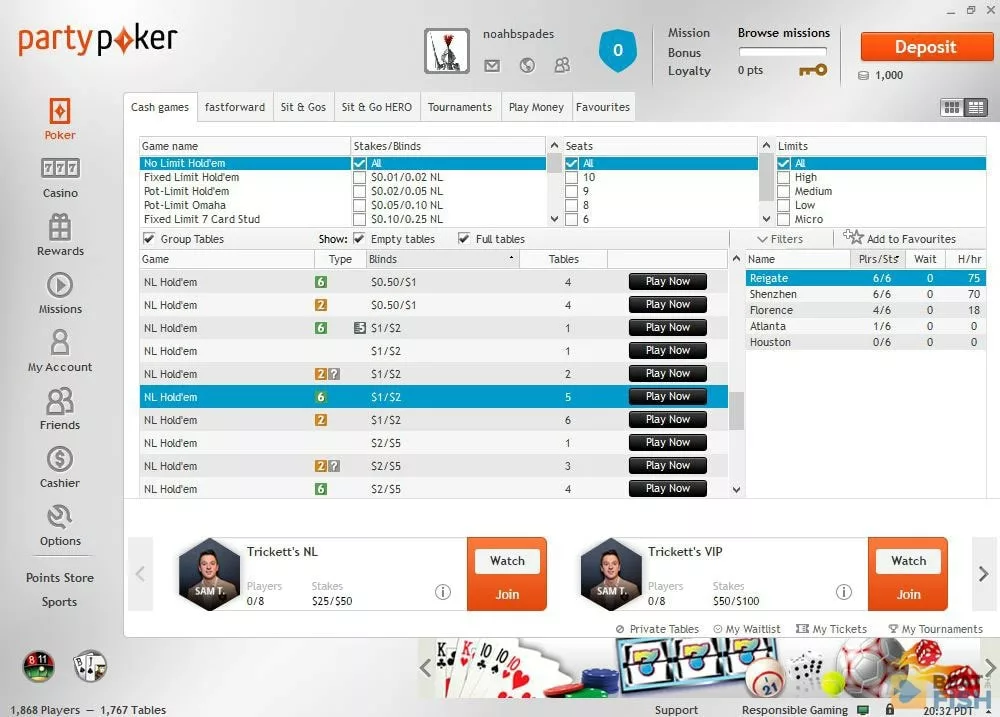
What they’ve done to ban poker HUDs
Anonymous tables. Party Poker has been intent on regaining its lost player base largely through encouraging recreational players. Banning all poker HUD cash game tracking use in 2016 was a huge step in that direction. Your opponents at cash game tables will only be identified as Player 1, Player 2, etc.
Quick seating. This eliminated seating script tools and “bum hunting” HUDs like poker copilot by forcing cash game players to play at whichever table the software chooses. After selecting your preferred table size and limit, the Party Poker software will automatically seat you. Players can no longer be followed or targeted.
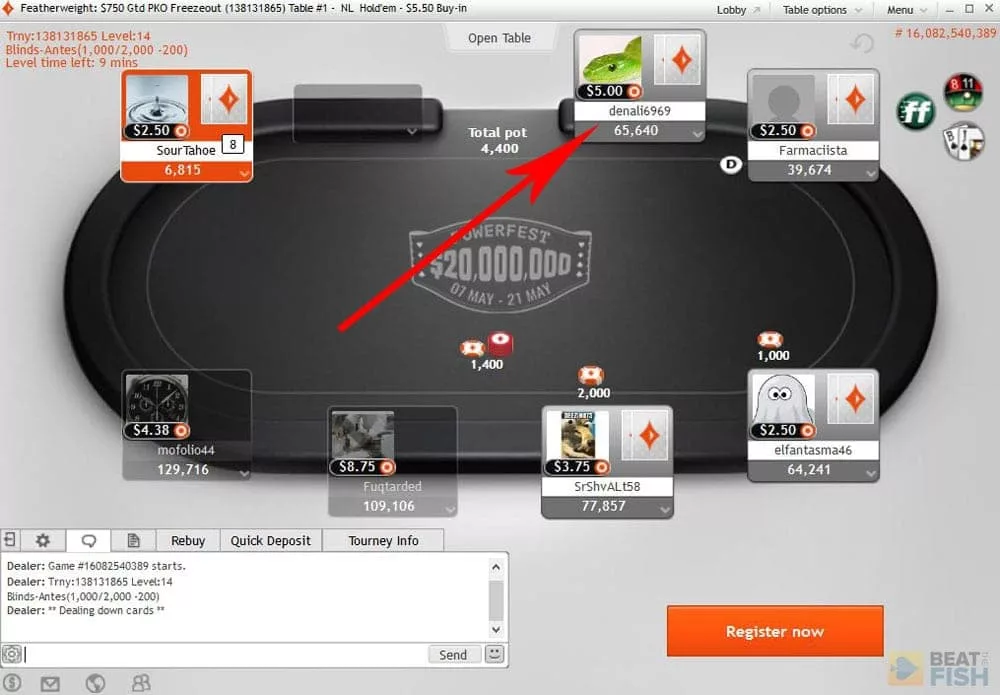
Players can change screen names once in a while. One way to combat poker tournament data mining and heads up displays is by occasionally allowing players to change their screen names in an easy self-service way. The catch? You can only do it every 180 days.
Still allows you to track your own play. This compromise seems like a very clever way to appease online poker HUD software users who actually want to use their hand history data solely to analyze their own play.
In my opinion, that’s the only perfectly legitimate reason to use poker tracking software. Party Poker allows players to download their hand histories to be imported into a poker HUD’s software program, but all other players at the table are still anonymous, rendering it useless for future sessions.
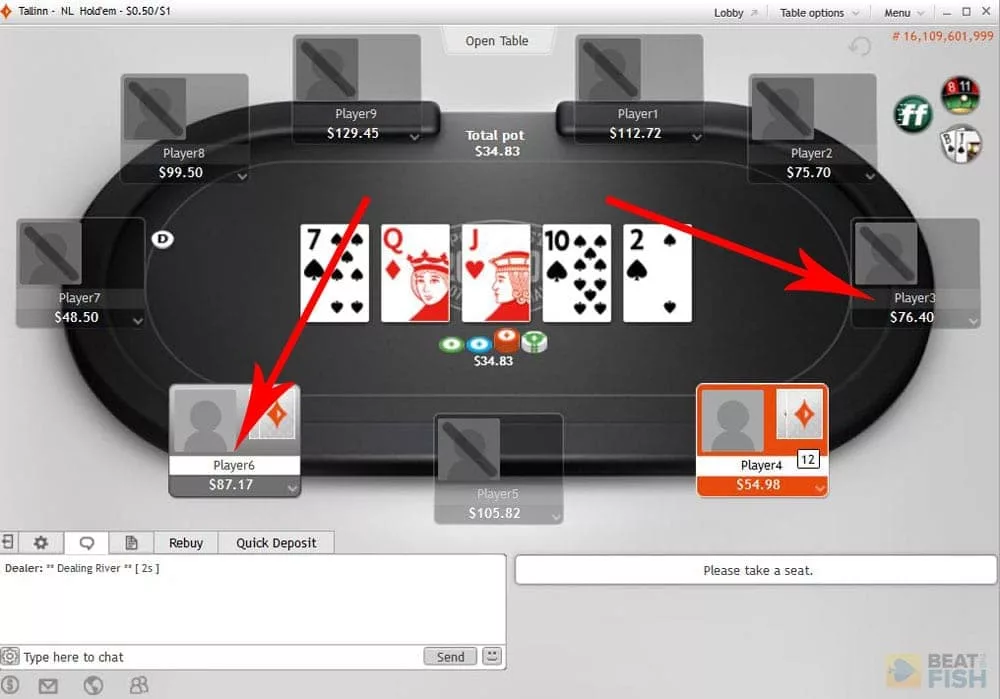
What could still be improved
Cash games only. While I prefer anonymity across all game types, Party Poker is still allowing tournament players to be identified by screen name at the table.
Although players are restricted from using HUD software to take notes on specific players, it’s hypothetically possible that tournament data and stats could be mined by third parties and used manually by players. This is the strategy that a poker tool like Sharkscope uses.
ACR Poker
ACR Poker (along with other sites on the Winning Poker Network like Black Chip Poker) introduced anonymous tables with a significant update on April 2020. This feature was aimed at protecting players from predatory practices like scripting, bum hunting, and data mining.
At these tables, players’ information, including nicknames, labels, and stacks, is hidden to observers. It’s only after a player is dealt into the game that they can access their opponents’ information for that session.
So anyone using HUDs won’t be able to collect data on opponents until actively participating in a game. The software essentially becomes useless and players on the poker site can enjoy the game with the peace of mind that their are not being preyed on.
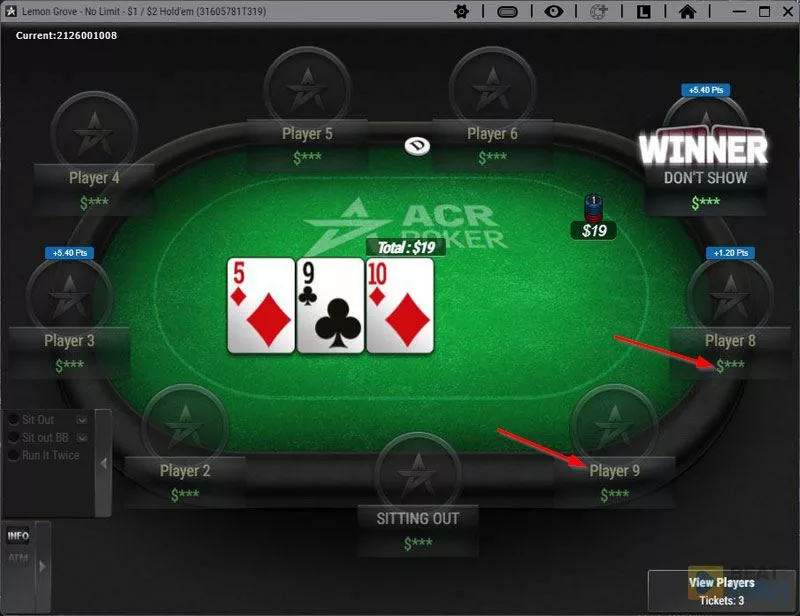
I was impressed when they launched this policy, and it certainly aligns with the poker room’s stance against the use of External Assistance Tools (EAT). The site has a comprehensive list of prohibited tools and reserves the right to deny service to players found using these tools, aiming to maintain the integrity of the game and protect players from unfair advantages.
Unlike some online poker sites that may offer limited protection (I’m looking at you, PokerStars), ACR Poker stands out by banning the use of virtual and remote access machines and introducing features like PLO Reshuffle to minimize collusion.
In fact, in 2023, the brand banned eight accounts involved in such activities and an additional 25 accounts as a precaution. This move, alongside the reimbursement of $184,000 to affected players, showcases what I would call a very rigorous approach to maintaining game integrity – especially when compared to other sites.
Even the best HUDs harmful to the poker economy
HUDs (or heads-up displays) allow an unfair advantage to any player using them. I believe that 100%. They allow players to automatically capture the gameplay data for every opponent seated at their table via hand histories without disclosing their existence.
Online poker HUDs like PokerTracker then create meaningful data on autopilot that is displayed during future play sessions by altering the view of an online poker site’s software.
Poker HUD players are playing on a PC, as there is a Windows and Mac version for most trackers. When you play against a HUD user, they can literally see statistics about you such as VPIP and PFR. These show how much a player voluntarily puts into the pot and the frequency a player makes a pre-flop raise.
HUDs can track your performance and tendencies at a granular level. These poker tools can show what you do most often on the flop, turn, and river. For a modest license cost, or even a free trial, customers of poker HUDs can see your lifetime performance, when you’re likely to bluff, how you perform on the button, and other stats.
Even random poker statistics, such as how often you’ve played an ante game or which card suit you like to play most, are all fair game to HUDs.
HUDs aren’t quite the equivalent of turning your face-down cards into face-up cards, but it comes close enough to take the odds out of your favor.
Does that sound fair to you?
Is using poker HUD software cheating?
I think using HUDs during games is borderline cheating, and I wouldn’t have to be convinced much that it is definitively.
Basically, HUDs collect data on everyone you play against and then put it into numbers displayed right next to your opponent’s seat at the table. HUDs can also run hand replayers outside of poker play sessions.
A poker HUD is a piece of software that runs on your computer and tracks your opponents’ statistics in real time. It can be used in conjunction with a poker tracker, which tracks your own statistics and hand history.
These poker tracking tools give users an edge over opponents by providing information that would otherwise be unavailable, putting others at a disadvantage. That information can be used at the sole discretion of the HUD user in the middle of a hand.
Unbeknownst to the recreational target, a poker HUD can track statistics such as how often a player raises, their lifetime losses, how often they fold to a 3-bet, and their overall win-rate.
Heads-up displays process data unfairly
HUD software developers who profit from selling packages to players like to point to the fact that heads up displays aren’t technically “stealing” data. They’re making use of hand history data that’s available to everyone. Anyone could form the same conclusions manually with enough database number crunching.
That’s absolutely true, and if any player wants to manually track what their opponents are doing through spreadsheets and calculators, then more power to them. Unfortunately, HUDs like Jivaro allow the equivalent of Johnny 5 to do the analysis for them. Even that could be acceptable if the line was drawn at data analysis.
However, in what I believe is the worst violation, HUDs display that opponent data in real-time right on top of the poker software.
HUDs alter a player’s view of the official poker site software, they don’t need to declare to anyone that they’re being used, and they’re only even available to advanced players who know they exist. It feels especially dangerous for heads-up players.
Doesn’t that sound like cheating to you?
Do anonymous tables stop heads up displays like PokerTracker?
Yes. Anonymous tables, which are used at poker sites like Bovada Poker and Ignition, are 100% effective in protecting players against HUDs because identifying players via hand history is the only way heads up displays can function.
Take away the ability to know a player’s history and you make them unable to be hunted by sharks. There is real value to players in anonymous tables.
Will all poker HUD sites eventually ban these tools?
There has been such a backlash against HUDs over the past several years that I expect this war against them to continue. The online poker industry was dying, due in no small part to professionals using HUDs, and it needed an intervention.
The numbers have shown palpable growth at sites that ban or restrict HUDs, so they’re going to continue to follow the bottom line.
That being said, I imagine at least a handful of poker sites such as PokerStars fear a revolt by their core HUD player base and pros who might be using such technology enough to leave them alone. The problem is, if HUD sites continue to be avoided by recreational players, I believe they’ll eventually die a slow shark-filled, rake-fueled death.
Is there any downside to poker sites banning HUDs?
The only complaint from Team HUD that feels to me like it goes beyond sour grapes is the argument that player anonymity gives rise to the chances of player cheating. However, I think the logic of that argument is at least somewhat flawed.
Before HUD banning, if an opponent was playing suspiciously, it was easy to keep track of them, look for their name in downloadable hand histories, and compare your results to others in the poker community who may have crossed paths with the same player.
The argument is that banning poker HUDs and, by extension, player identities in hand histories, eliminates that.
I disagree.
No poker site that bans HUDs hides your hand histories. You just can’t use them with screen names to gain an unfair advantage. You can still review every hand you’ve played and look for signs of cheating to your heart’s content.
Ignition Poker takes it one step further and even allows you to see every player’s hole cards after 24 hours, even if they folded pre-flop.
Technically, that makes it easier than the pre-HUD backlash to track cheating. Just send the poker site’s support team an email with the hand number and as many details as possible.
Players think the poker sites can’t identify everyone
Just because you can’t identify the player in hand histories doesn’t mean the poker site can’t. What an awful security risk it would be if sites couldn’t know who their own players were at the tables.
True, there is a lot of trust involved with relying on the poker sites without HUD support to follow up on cheating claims, but there’s a lot of trust involved with the free market that is online poker to begin with.
If you don’t trust your online poker home, find a new one. If you don’t trust anyone, why make yourself miserable and play online poker at all?
The future of HUDs – will AI come into play?
AI is elevating the capabilities of just about every kind of software out there today, so I’ve been thinking a lot lately about how it might impact the sophistication of HUD programs and bring them beyond their traditional functionalities.
I definitely am concerned that AI-driven analytics will begin to provide deeper insights into opponents’ strategies, enabling even more exploitative play. New platforms like Advanced Poker Training and PokerSnowie leverage AI to provide real-time feedback and strategic advice, while DeepStack uses deep learning to improve decision-making. Implementing these tools with existing HUDs could put the online poker community onto yet another slippery slope.
I’d love for the bigwigs in the online poker world to have the foresight that this type of integration is on the horizon and is a very real threat that could have the same nearly-dire consequences that the original introduction of HUDs had. By introducing policies and regulations that limit the use of HUDs or ban them altogether, they would do us all a favor and nip the issue in the bud.
✅ What is a HUD in online poker?
A HUD (or heads-up display) is tracking software that allows you import online poker hand histories. HUDs display information alongside or on top of an online poker site’s software, displaying information on how your opponents have previously played hands. Ignition Poker is currently my favorite poker site than bans HUDs. Their web-only software makes it incredibly difficult for rule-breakers to even try to use a HUD there.
✅ Does PokerStars allow HUDs?
Yes. PokerStars has a complicated history with HUDs, as a large portion of their players are experienced online poker players who utilize tracking software to their advantage. PokerStars currently does allow some HUDs and maintains a list of ones that are allowed.
✅ What is the best poker HUD?
Personally, I do not support the use of any HUD or tracking software beyond what is officially integrated into a poker site’s software package. My biggest reason for that is the unfair advantage it allows over inexperienced and/or mobile players.









